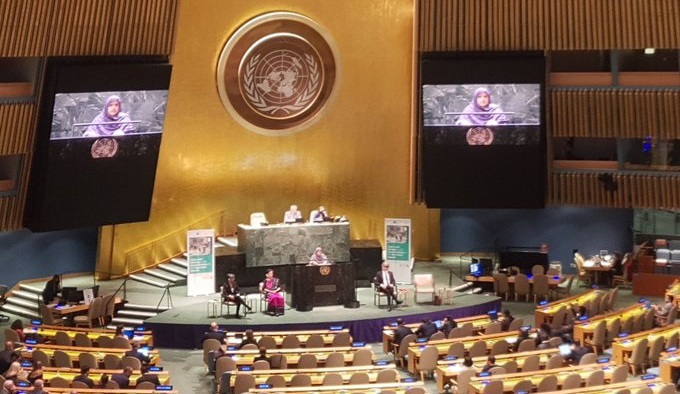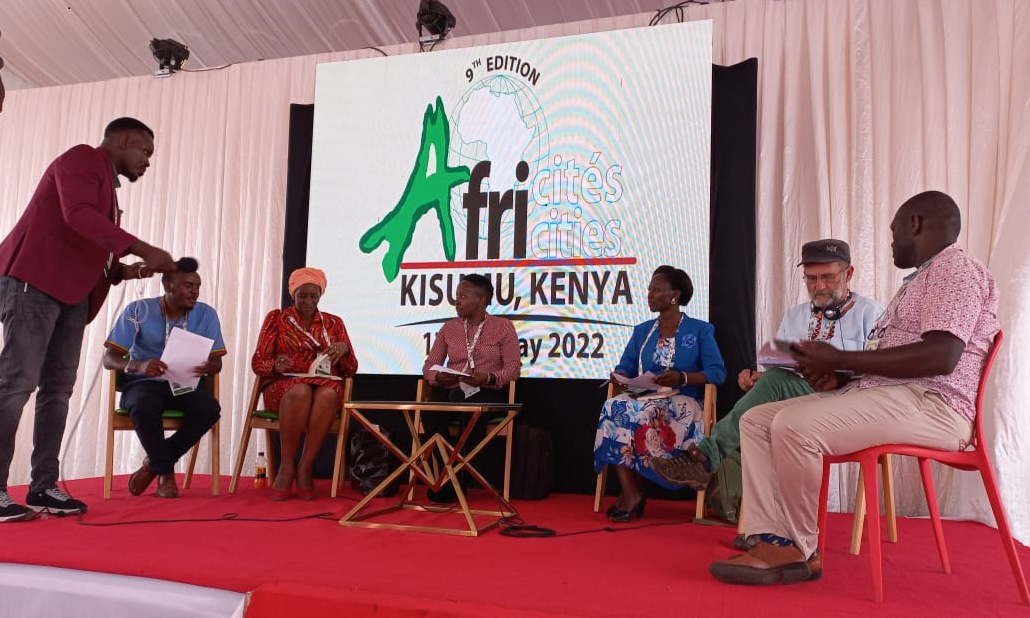Position Paper of the Consult on Women and Land Rights
For Circulation at NGO Hearing for MDG June 23-24 , New York
As member States of the United Nations prepare to review the implementation of the Millenium Declaration and its development goals (MDGs) five years after they committed to their own peoples and the peoples of the world to substantially reduce poverty, we, members of the Consult for Women and Land Rights (CWLR -a network of organisations and social movements working on promoting women’s equal rights to land and other natural resources), enjoin them to give serious attention to the following key issues :
1. Eradicate poverty and hunger among women by improving access to land resources
In order to achieve the first development goal, which is
To eradicate extreme poverty and hunger: Reduce by half the proportion of people living on less than a dollar a day; Reduce by half the proportion of people who suffer from hunger.
The rights of women to economic resources cannot be ignored. Women worldwide play a central role in ensuring family food security. They also produce goods and provide services to earn income for the family, as both primary and secondary income earners. Yet, the majority of the world’s women are resource poor. Hunger is chronic among women and children in many women headed households. The reason: they lack access and control over land including village common lands and forests.
It is critical for women, who live in rural areas and depend on agriculture and related activities for survival, to gain access and control to land and to usufruct rights on village common lands, forests and pastures through individual/ group/collective holdings.
2. Promote gender equality and empower women to stimulate development and reduce poverty and hunger
Goal 3, “Promote gender equality and empower women,” focuses on education for women but is better elaborated in the Millenium Declaration that resolves,
To promote gender equality and the empowerment of women as effective ways to combat poverty, hunger and disease and to stimulate development that is truly sustainable. (III, 20)
Many women’s NGOs maintain that the attainment of the MDGs depends on women’s empowerment and gender equality, as they declared in their statement at the Asia-Pacific NGO Forum on Beijing+10 on 3 July 2004 in Salaya, Nakornpathom, Thailand.
The UN Commission on the Status of Women, in its 49th Session in March 2005, declared, “We… emphasize that the full and effective implementation of the Beijing Declaration and Platform for Action is essential to achieving the internationally agreed development goals, including those contained in the Millennium Declaration….”
It is critical for the Millennium Summit + 5 to affirm the importance of fully and effectively implementing the Beijing Declaration and Platform for Action and to declare that these internationally agreed documents will not be sidelined in favor of the MDGs.
3. Improve maternal health, reduce child mortality by improving access to livelihoods
Women’s income poverty and hunger, as well as their low status in the family and community, are central causes to their low maternal health.
In order to achieve the MDG Goals
“Reduce by two thirds the mortality rate among children under five,” and “Reduce by three quarters the maternal mortality ratio,”
Women’s poverty and hunger must be tacked first. There is sufficient research to show that when women’s incomes increase, these incomes go directly to improving household consumption. Rural women’s incomes in developing nations can only increase if they own land, individually or jointly, and have access to usufruct rights to common lands and forests. Women’s lower status within households and in their communities is reinforced by their exclusion from independent ownership of land and resources.
It is critical for the Millennium Summit + 5 to recognize that the improvement of maternal and child mortality levels is linked with improved access to food and livelihood resources by women.
4. Ensure environmental sustainability by giving women conservation rights
Sustainable development requires tapping the indigenous wisdom of people. Women, as primary users of fuel wood and fodder, hold many of their communities’ traditional knowledge systems on how to maintain the forest sources of these natural resources. Women, who are key users and conservers of the natural resource base, should be given collective rights to control and manage it sustainably. Women are also involved in initiatives to protect forests from destruction by commercial interests. Women should be supported as they work to “reverse loss of environmental resources”.
In many developing countries where land holdings are small and cannot sustain people, the poor depend critically on the larger surrounding natural resource base for household and livestock needs. This natural resource base comprises village commons and public lands, including reserve forests and revenue lands owned by governments. Limiting access to these lands, limits people’s livelihood options and can lead to hunger, malnutrition, poor health, and acute poverty. Policy and law needs to recognize the primacy of subsistence use and local markets, rather than commodification for global markets. Local communities should be encouraged to conserve and regenerate the resource base through active participation in decision-making and natural resource management.
Five of the eight MDGs, as evidenced above, clearly require the implementation of policies that promote women’s land and livelihood rights.
Further, the goal of environmental sustainability includes the intent to “achieve significant improvement in lives of at least 100 million slum dwellers by 2020” and to “reduce by half the proportion of people without sustainable access to safe drinking water”. The realization of these goals will be facilitated by guaranteeing women the right to adequate housing, including the right to own housing land.
Previous international declarations and commitments made by UN member States reinforce the MDGs. For example, women’s equal rights to land and housing are recognized in the Beijing Platform for Action and in the Five Year Review Outcome Documents (see Para 58(m) and Para 166(c)).
Action for achievement of the MDGs requires the following inclusions:
Reduce gender inequality and poverty by increasing women’s ownership on land and productive assets:
- To increase women’s assets through increasing ownership of land and housing in women’s name, strengthening skills, knowledge, bargaining power, and access to new technologies
- Ensure that land is given directly to women tillers and SHGs for economic programs on a lease of 40 years rather that sold through international agencies.
- Ensure gender sensitive land tenure context mapping at all levels to get the base line figures for land rights with emphasis on dalit, ethnic and indigenous women.
- Allocate 30% of rural development resources for women’s resource right program
- Change inheritance laws in favor of daughters and widows to promote gender equality in private property.
- Enshrine in policy the primacy of subsistence use of forest and commons over market and recognize women as the primary users of Forests.
- Make legal provision for control, access as co-owners and inheritance of common property resources for rural poor women, irrespective of their marital status.
Indicators:
- The need for appropriate monitoring and evaluation frameworks, including appropriate gender indicators, integrated through out the entire framework
- Develop gendered indicators for assessing how governments are responsive to gender issues (beyond gender budgets)
- Need for gender segregated data on land ownership and other resources.
Include land ownership in the name of women as an indicator of poverty reduction in the MDG.
This will also contribute towards fulfilling commitments made during Beijing Conference, Conference on hunger and poverty, Earth summit, The World Food Summit and the Habitat agenda as well as under ICESCAR Art. 11 and CEDAW Art. 14, 15 and 16. It also will support UNHCR Resolution 2003/22 (women’s equal ownership of, access to and control over land and equality rights to own property and to adequate housing) and ensure effective participation of women in governance and decision making processes at all levels
Consult on Women and Land Rights (CWLR) includes:
Asia Women Watch, HIC-Housing and Land Rights Network (South Asia Regional Programme), Programme on Women’s Economic, Social and Cultural Rights (PWESCR), Asia Pacific Women and Law Development, Angikar Bangladesh, National Land Rights Control Group Nepal, Society for Partners in Development, ICWR,CWDS,CSRC, PAIRVI, NACDOR, India Women’s Watch , Jagori, Joint Women’s Program, Social Development Foundation, Sathi all for partnerships, Mahila Dakshita Samiti, Action Aid India, Ekta Parishad, Mahila Samakhya AP and UP, Dalit Bahujana Shramick Union, Working Group for Women and Land Ownership, Mamta Sanstha, Sainio Ka Sangathan, Sri Bhuneshwari Mahila Ashram, Pragati Sheel Mahila Manch, Sambandh Network, Prayas, Mahila Kalyan Sanstha, Himalayan Community Forestry Centre, Maati, Mahila Samakhya,Srijan, Sahyog, Dynamic Action Group, Adithi for Women, IWID, Nirmana and Saheli Adhyan Kendra.
For more information contact:
Consult for Women and Land Rights
E-09 Anand Lok
Mayur Vihar Phase I
New Delhi 110091
India
Tel: +91-11-22750914
E-mail: CWLR@yahoogroups.com
bhardwaj_s@vsnl.net


